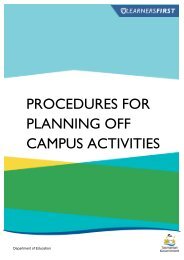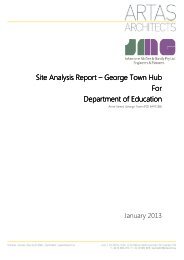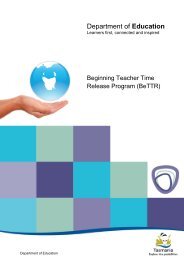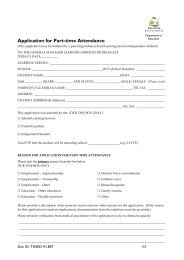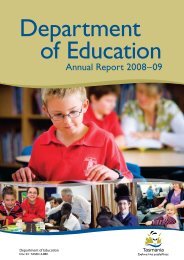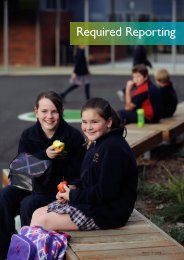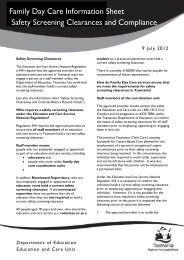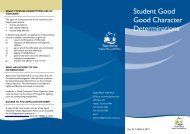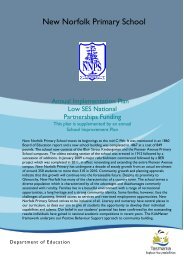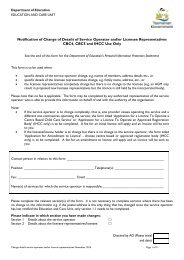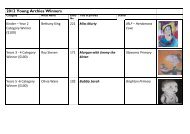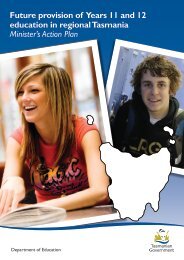Education
DoE Annual Report 2012-2013 - Department of Education
DoE Annual Report 2012-2013 - Department of Education
- No tags were found...
You also want an ePaper? Increase the reach of your titles
YUMPU automatically turns print PDFs into web optimized ePapers that Google loves.
2. Training for all school staff to improve<br />
understanding of their obligations under the<br />
DSE and how to meet those obligations<br />
Access to an online interactive learning module on the<br />
DSE outlining responsibilities and implications for school<br />
practice is currently under development in collaboration<br />
with other state jurisdictions and the University of<br />
Canberra. Upon completion, this module will be used<br />
through principal networks and with school staff.<br />
Through the Professional Learning Institute a four day<br />
spaced program titled Empowering Diversity in our Schools<br />
was offered in 2012 and again in 2013. The program<br />
utilises current research and practice that builds inclusive<br />
school cultures linked to the school improvement<br />
agenda; the implementation of the Disability Standards for<br />
<strong>Education</strong> 2005; the use of the tool The Index for Inclusion;<br />
and work relating to the effective use of support staff and<br />
paraprofessionals in inclusive schools.<br />
3. Assistive technologies to support the teaching<br />
and participation of students with disability<br />
The provision of current technologies supports students<br />
with disability in both special and mainstream schools to<br />
access and engage in the broader curriculum – especially in<br />
literacy learning and augmented communication.<br />
A total of 658 iPads, covers, and iTunes support was<br />
purchased and allocated for individual student use by<br />
June 2013. A total of 14 interactive whiteboards was<br />
allocated to special schools and a range of assistive<br />
technologies for students in mainstream schools with<br />
vision impairment including Braille display devices, portable<br />
magnification devices and upgraded JAWs (screen reader<br />
software) and Duxbury (Braille translation software)<br />
licenses.<br />
4. Training for teachers to strengthen their<br />
skills in the use of assistive technology within<br />
the classroom<br />
Professional learning has been provided for special<br />
education advisors, teachers and teacher assistants in<br />
the use of assistive technologies for communication<br />
and literacy development for students with disability.<br />
This includes a three day program (one day per term) for<br />
320 teachers statewide (with teaching relief provided)<br />
and 350 days across the two years for relief for teacher<br />
assistants to participate in professional learning in the use<br />
of assistive technologies.<br />
5. Additional support for students with<br />
disabilities to transition effectively between the<br />
stages of schooling and/or from schooling into<br />
further education, training or employment.<br />
To reduce problems and stress during transition for<br />
students with disability and their families, a set of materials<br />
and resources for use by schools and families is under<br />
development in collaboration with TASCARE to support<br />
effective transition between stages of schooling.<br />
Professional learning sessions have been delivered in<br />
each Learning Service and a series of forums for parents<br />
and community members have been developed and<br />
conducted throughout March 2013. Allocations have<br />
been made to school resource packages to support<br />
individual and small group transition plans for students<br />
with high-transition support needs from 2012 to 2013.<br />
Allocations were made to 74 schools (primary, secondary,<br />
senior-secondary and special schools) totalling $168,723<br />
in support of transition processes at the beginning of<br />
November 2012.<br />
Tasmanian Adult Literacy Action Plan 2010–2015<br />
The action plan includes the $1 million Adult Literacy<br />
Investment Fund which provides funding for literacy skills<br />
development projects across the LINC network, including<br />
projects targeting the needs of a particular community or<br />
client groups within Tasmania.<br />
A Literacy Coordinator Network has been established<br />
throughout the state and is supported by a pool of trained<br />
volunteer tutors to drive the Adult Literacy Network.<br />
LINC services work with disability service providers and<br />
community organisations to identify and support those<br />
who could benefit from core skills programs.<br />
Two specific grant programs under the action plan are<br />
administered by Skills Tasmania:<br />
1. The Employer Pledge Program funds projects where<br />
employers pledge to support the development of<br />
literacy skills for employees within their organisations<br />
by allowing employees to participate in literacy<br />
support projects and training during work hours.<br />
2. The Adult Literacy Community Grants Program funds<br />
projects with community partnerships and innovative<br />
approaches for specific target groups – including<br />
people with a disability – to improve the core skill<br />
levels of Tasmanian community members in order to<br />
facilitate improved access to education, training and<br />
employment.<br />
72 Required Reporting » Disability Framework for Action



